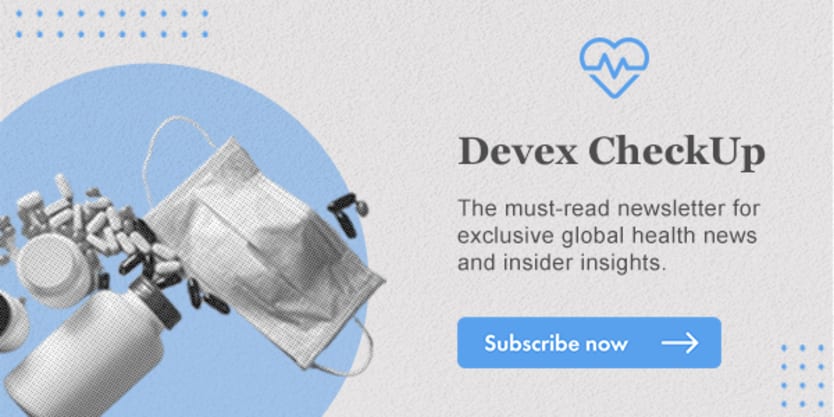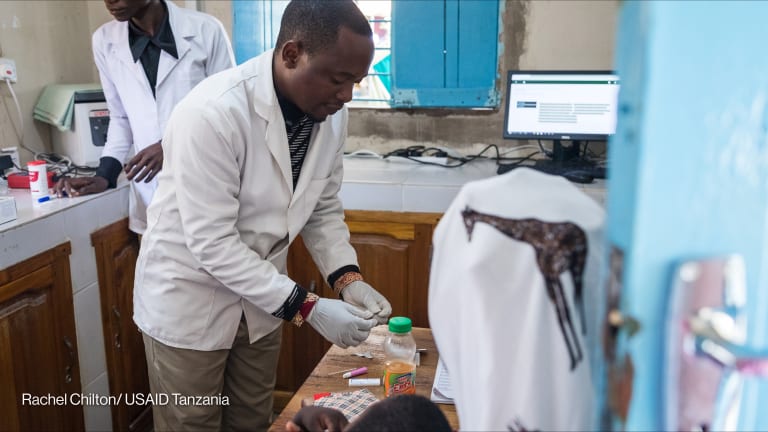
If we declare the end of the pandemic, is it actually over?
There seems to be a philosophical discussion taking place in countries where majority of the population is triple vaccinated, where there is a clear delinkage between cases and severe illness and death. In these countries, people understandably want to declare an end to the crisis.
However, we still do not have the full picture of the nature and spread of COVID-19 in many low- and middle-income countries. What we do know is that their general population remains largely unvaccinated and susceptible to new variants, a situation that is exacerbated where there is rising conflict and population migration.
The must-read weekly newsletter for exclusive global health news and insider insights.
With fragile health systems and a depleted and exhausted health workforce, now is the moment to insulate ourselves against future waves by equitably sharing vaccines while also strengthening health systems, which are both mutually reinforcing.
Whether people view the pandemic as over or not, the pandemic is still causing severe disruption to health services and unacceptably high mortality, particularly among health workers and vulnerable groups.
Due to unparalleled scientific attention, there are increasingly more tools in the box to protect and treat people with COVID-19, but there are still huge differences in access, dependent on factors such as geography and conflict. For example, while new treatments seem to be working to reduce severe infection, they’re so far only available in a small number of countries. Furthermore, unless quality rapid tests are widely available, patients may not start taking treatment early enough in the course of disease to prevent the worst outcomes.
Protectionist approaches to manufacturing and trade will only aid the spread of the virus, we must act globally and ensure that tools such as vaccines can be produced worldwide.
—Vaccine supply was the main barrier for most of 2021 but by the end of the year, while supply had improved, there remained issues in distribution and getting vaccines to the people that need them most. The systemic problems that led to a small number of countries hoarding the majority of supply have still not been overcome.
This could undermine access to the next generation of vaccines and mean that LMICs are as ill-prepared for the next pandemic as they were in 2020. According to current trajectories, several countries in the African continent will not meet the 70% threshold until August 2024.
Going forward, we need a two-pronged attack to truly end the acute stage of this pandemic. First, mechanisms such as the Access to COVID-19 Tools Accelerator and Africa Vaccine Delivery Alliance, can get treatment tools and vaccines to those that need them most, especially those with limited access.
Supply should be as predictable as possible so that trained health workers and supply chains can be synchronized effectively, this way all communities are reached. To finance this, government leaders should join the fair share-based financing initiative, which involves contributing funds based on a country’s economic size. This isn’t charity, it’s fair economics and the best way to fight this virus.
Second, we need to turn manufacturing on its head and break the monopoly of the small number of manufacturers in just a few countries producing health tools. From personal protective equipment at the start of the pandemic, to treatments, tests, and vaccines — there have been systemic challenges throughout which have been revealed and exacerbated by the virus.
Protectionist approaches to manufacturing and trade will only aid the spread of the virus, we must act globally and ensure that tools such as vaccines can be produced worldwide if we are to end the acute stage of this pandemic. As WHO Director-General Dr. Tedros Adhanom Ghebreyesus puts it: “No other event like the COVID-19 pandemic has shown that reliance on a few companies to supply global public goods is limiting, and dangerous.”
The recent announcement that Egypt, Kenya, Nigeria, Senegal, South Africa, and Tunisia will receive the technology to produce messenger RNA vaccines is a welcome first step, but it is not enough. We need homegrown solutions in order to be self-sufficient. We need more bottom-up solutions, with a dedicated commitment to building local capacity.
WHO’s mRNA technology transfer hub in South Africa, which is now linking with LMICs to share technology and build mRNA capacity globally to fight COVID-19 and other viruses, is a good example of changing the model. However, we need to find new ways to open up the market further. For instance, there are also pooled licensing mechanisms, such as the COVID-19 Technology Access Pool, which would allow manufacturers to share licenses, technology, and know-how, and boost manufacturing this way.
Organizations such as Gavi, the Vaccine Alliance and UNICEF can also support this geographical strengthening of manufacturing by purchasing vaccines from LMICs. Strengthening the regulatory system in LMICs will also be really critical to the long-term success of these endeavors.
One of what underlines overcoming these two challenges is a colonial mindset. While leaders in high-income countries have been saying for more than a year that no one is safe until everyone is safe, the on-the-ground reality does not reflect this.
High-income countries would not be satisfied with just relying on natural immunity, so we should not lose the original intention of vaccinating 70% of people in every country now that the West has reached its goal, instead, we should redouble our efforts and push urgently for the original global goal, rather than abandon it, and the parts of the world that have not been able to vaccinate their populations.
TRIPS standoff continues in the new year
A new year has nothing to ease the global standoff within the World Trade Organization over the waiver of the Trade-Related Aspects of Intellectual Property Rights, as the EU dismissed India's proposal to discuss it further as "premature."
South African President Cyril Ramaphosa summed up the mindset problem at the African Union and European Union summit by noting that if governments cannot agree on a waiver of intellectual property on COVID-19 tools in a time of emergency, they will have failed, and more lives will have been lost.
While some EU leaders have suggested that there could be resolution by spring, now is not the moment to kick the can down the road. With more than 100 countries supporting, the few countries that are taking a retrograde position to block the free spread of intellectual property, which was largely taxpayer funded, should now and finally grant the TRIPS waiver.
Ending the emergency is also the fastest way to rebuild health systems and refocus our attention on strengthening health services everywhere. It’s of course not an either-or. We must do both simultaneously. This is what building back better means for LMICs. COVID-19 has revealed the weaknesses in the system, and we need to address these as well as the pandemic itself.
Through pragmatic leadership, the world can end the acute stage of this pandemic quickly and prepare for future waves of COVID-19 ensuring less disruption and death while also pandemic proofing the health system.









